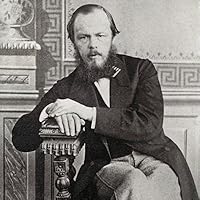Buffoonery Quotes
Quotes tagged as "buffoonery"
Showing 1-9 of 10

“You said just now, "Don't be so ashamed of yourself, because that's the root of your trouble"––with those words, you seem to have reached right into my innermost soul. What I mean is, when I visit people, I always feel that I'm really the lowest of the low, that everybody takes me for a buffoon, so I say to myself, why shouldn't I act the fool, I'm not afraid of what any of you might think, because every single one of you is even worse than me. That's why I'm a buffoon, I'm a buffoon born of shame, great starets, of shame. It's anxiety pure and simple that makes me so unruly.”
― The Brothers Karamazov
― The Brothers Karamazov
“I had artistic classical training, and when you learn the classics for so many years, you might gain audacity, power and confidence to subvert everything. I am like the originals buffoons. I love the rules because I can break them.”
―
―

“Noble starets, tell me, are my high spirits offensive to you or not?" Fyodor Pavlovich suddenly exclaimed, gripping the arms of his chair with both hands and appearing ready to leap out of it, depending on the reply.”
― The Brothers Karamazov
― The Brothers Karamazov

“[H]e was one of those people who got to the top of an organisation through luck, connections, the indulgence of superiors and that sort of carelessness towards others that the easily impressed termed ruthlessness and those of a less gullible nature called sociopathy. But sometimes, just through his sheer unthinking brusqueness and inability to think through the consequences of a remark, he said what everybody else was only thinking. A comic poet working in obscene doggerel.”
― The Algebraist
― The Algebraist

“Bulgakov always loved clowning and agreed with E. T. A. Hoffmann that irony and buffoonery are expressions of ‘the deepest contemplation contemplation of life in all its conditionality’.
It is not by chance that his stage adaptations of the comic masterpieces of Gogol and Cervantes coincided with the writing of The Master and Margarita. Behind such specific ‘influences’ stands the age-old tradition of folk humour with its carnivalized world-view, its reversals and dethronings, its relativizing of worldly absolutes—a tradition that was the subject of a monumental study by Bulgakov’s countryman and contemporary Mikhail Bakhtin. Bakhtin’s Rabelais and His World, which in its way was as much an explosion of Soviet reality as Bulgakov’s novel, appeared in 1965, a year before The Master and Margarita. The coincidence was not lost on Russian readers. Commenting on it, Bulgakov’s wife noted that, while there had never been any direct link between the two men, they were both responding to the same historical situation from the same cultural basis.”
― The Master and Margarita
It is not by chance that his stage adaptations of the comic masterpieces of Gogol and Cervantes coincided with the writing of The Master and Margarita. Behind such specific ‘influences’ stands the age-old tradition of folk humour with its carnivalized world-view, its reversals and dethronings, its relativizing of worldly absolutes—a tradition that was the subject of a monumental study by Bulgakov’s countryman and contemporary Mikhail Bakhtin. Bakhtin’s Rabelais and His World, which in its way was as much an explosion of Soviet reality as Bulgakov’s novel, appeared in 1965, a year before The Master and Margarita. The coincidence was not lost on Russian readers. Commenting on it, Bulgakov’s wife noted that, while there had never been any direct link between the two men, they were both responding to the same historical situation from the same cultural basis.”
― The Master and Margarita

“With "gay marriage," the last shreds of meaning will be stripped away from marriage, with homosexuals finishing what faithless, selfish heterosexuals have begun.”
―
―

“Sandy Hill Pittman was hysterical.”
― Into Thin Air: A Personal Account of the Everest Disaster
― Into Thin Air: A Personal Account of the Everest Disaster

“Sandy Hill Pittman was hysterical.”
― Into Thin Air: A Personal Account of the Mt. Everest Disaster
― Into Thin Air: A Personal Account of the Mt. Everest Disaster
All Quotes
|
My Quotes
|
Add A Quote
Browse By Tag
- Love Quotes 100.5k
- Life Quotes 79k
- Inspirational Quotes 75.5k
- Humor Quotes 44k
- Philosophy Quotes 30.5k
- Inspirational Quotes Quotes 28.5k
- God Quotes 27k
- Truth Quotes 24.5k
- Wisdom Quotes 24.5k
- Romance Quotes 24k
- Poetry Quotes 23k
- Life Lessons Quotes 22k
- Quotes Quotes 20.5k
- Death Quotes 20.5k
- Happiness Quotes 19k
- Hope Quotes 18.5k
- Faith Quotes 18.5k
- Inspiration Quotes 17k
- Spirituality Quotes 15.5k
- Relationships Quotes 15.5k
- Religion Quotes 15.5k
- Motivational Quotes 15k
- Life Quotes Quotes 15k
- Love Quotes Quotes 15k
- Writing Quotes 15k
- Success Quotes 14k
- Motivation Quotes 13k
- Travel Quotes 13k
- Time Quotes 13k
- Science Quotes 12k

